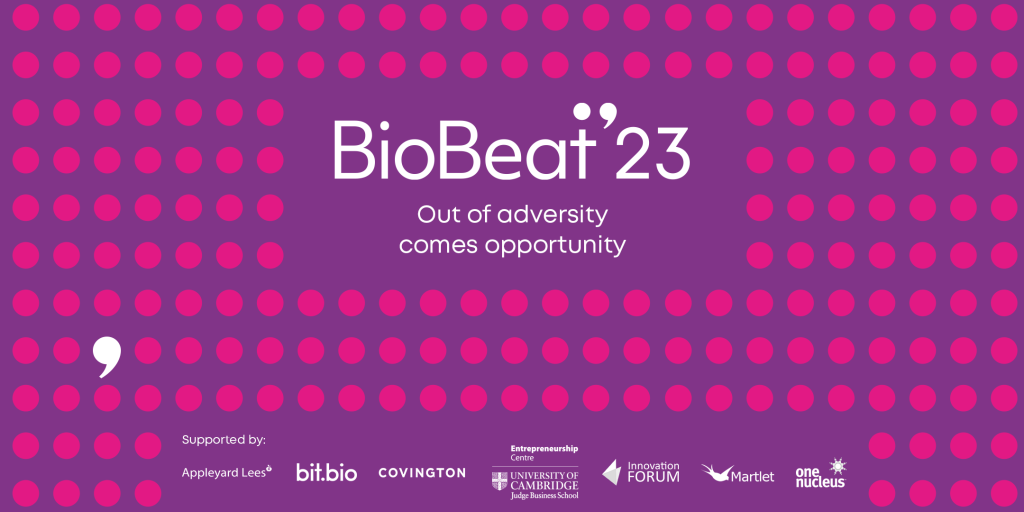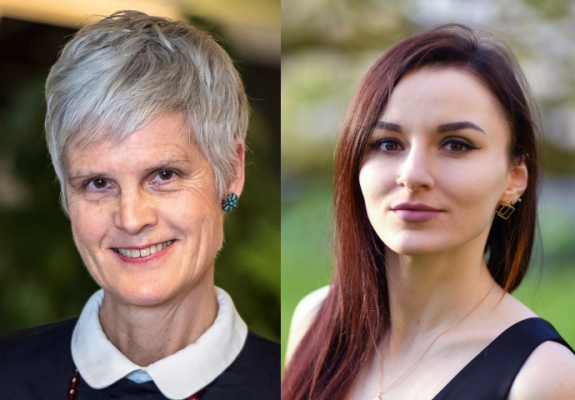Ahead of BioBeat23, Miranda Weston-Smith, BioBeat founder, talks to Alisa Molotova, Investment Manager at Martlet and co-organiser of BioBeat23 about her investment journey.
Miranda: It’s a total pleasure working with you on BioBeat23: Out of adversity comes opportunity on 18 May at the Cambridge Union. I’m curious to know, how did you get into biotech investing?
Alisa: I spent years in the lab studying the intricacies of cellular biology and regenerative medicine. It was a fascinating field, but I soon realised that my passion for science extended beyond the lab bench. In the final years of my PhD, I started exploring the world of early-stage start-ups through consulting projects and joining a start-up myself and I quickly realised that my scientific background in stem cell science was a huge asset.
Miranda: In your investment role, what is the perspective you bring?
Alisa: I was drawn to the idea of supporting and investing in early-stage biotech companies and my training gave me a unique perspective on the scientific potential and feasibility of their ideas. I was then able to secure my first investing role, where I was able to apply my scientific training in the world of early stage investment.
In addition to my scientific background, I bring a different perspective in terms of diversity. As someone from a working-class background and a first-gen university student, I faced significant challenges in accessing education and opportunities that are typically available to those from more privileged backgrounds. Navigating these obstacles make me more resourceful and better equipped to assess and mitigate risks in the biotech industry, which is inherently high-risk and often requires creative problem-solving.
Moreover, given the current gender imbalance in both VC and female-lead start-up teams, having a female perspective helps identify and invest in companies that prioritise diversity and inclusivity, which have been shown to lead to better outcomes. No groupthink on my watch!
I am also autistic and while autism can present certain challenges, it also provides unique advantages such as the ability to deeply understand complex scientific concepts and approach problems in creative ways. Another advantage of being autistic in my industry is that I am less influenced by social dynamics or preconceptions, allowing me to make objective evaluations based solely on data and evidence. This can be particularly valuable in the early-stage biotech investing world, where decisions must be made based on limited information and a high level of uncertainty.
Miranda: Looking into the arena of healthcare product investment, how is the balance changing between tech first and biology first for these products?
Alisa: One reason for the shift towards biology-first approaches is the increasing availability of data on the human genome and the underlying biology of diseases. This data is allowing researchers to develop more targeted therapies that are tailored to individual patients, rather than relying on a one-size-fits-all approach, which historically has been tailored towards a Western white male. Biology-first approaches are particularly well-suited to precision medicine, as they allow researchers to develop treatments that are tailored to individual patients based on their specific biological characteristics.
While tech-first approaches will continue to play an important role in healthcare, the balance is shifting towards biology-first approaches as our understanding of the underlying biology of diseases improves. The convergence of technology and biology is also becoming increasingly important, as companies develop innovative solutions that combine the two approaches through AI and machine learning.
Miranda: And with your responsibility for new deals, what are the areas where you see budding biotech entrepreneurs most active?
Alisa: There are so many exciting areas of biotech that are quickly picking up pace but there are several common emerging themes.
Gene editing is a rapidly growing field that involves using technologies such as CRISPR/Cas9 to modify DNA sequences. This technology has the potential to revolutionise medicine as well as development of crops that are more resistant to the effects of climate change and more efficient and sustainable biofuels that can replace fossil fuels.
AI and machine learning are rapidly growing fields that are increasingly being applied to healthcare. This includes developing new algorithms for drug discovery, patient monitoring, and medical imaging analysis. Digital health is also an emerging field that involves using technology to improve healthcare outcomes. This includes developing new digital health platforms, wearables, and telemedicine services.
I’ve also observed a shift towards development of neurotech and solutions such as brain-computer interfaces, neurostimulation devices, and virtual reality therapies to treat conditions such as Parkinson's disease, Alzheimer's disease, and depression.
Overall, there are many exciting areas where budding biotech entrepreneurs are active, leveraging the latest technologies to tackle some of the biggest challenges facing our society, from climate change to neurological disorders.
Miranda: Thank you Alisa for your valuable insights. I know we are both much looking forward to the panels and conversations at BioBeat23.
We give deep thanks to BioBeat23 supporters: Appleyard Lees, bit.bio, Covington, Entrepreneurship Centre, Cambridge Judge Business School, Innovation Forum, Martlet, One Nucleus.
BioBeat23: Out of adversity comes opportunity, 13.30-18.15, Thursday 18 May, Cambridge Union.
Register here

